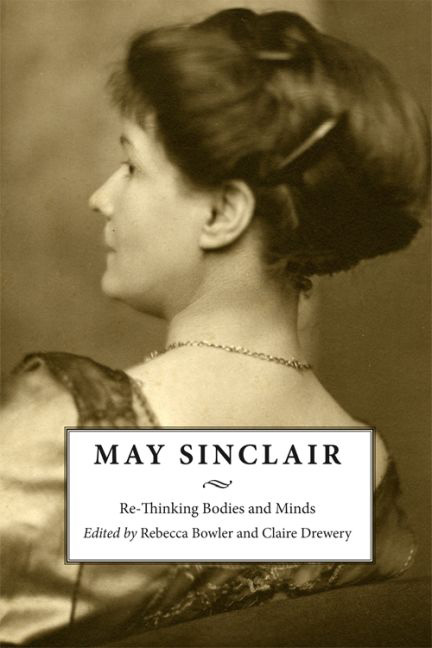Book contents
- Frontmatter
- Contents
- Acknowledgements
- Introduction: May Sinclair's Interdisciplinarity
- Part I The Abstract Intellect
- 1 ‘Dying to Live’: Remembering and Forgetting May Sinclair
- 2 Learning Greek: The Woman Artist as Autodidact in May Sinclair's Mary Olivier: A Life
- 3 Portrait of the Female Character as a Psychoanalytical Case: The Ambiguous Influence of Freud on May Sinclair's Novels
- 4 Feminism, Freedom and the Hierarchy of Happiness in the Psychological Novels of May Sinclair
- 5 Architecture, Environment and ‘Scenic Effect’ in May Sinclair's The Divine Fire
- Part II Abject Bodies
- Notes on Contributors
- Index
4 - Feminism, Freedom and the Hierarchy of Happiness in the Psychological Novels of May Sinclair
from Part I - The Abstract Intellect
Published online by Cambridge University Press: 26 May 2017
- Frontmatter
- Contents
- Acknowledgements
- Introduction: May Sinclair's Interdisciplinarity
- Part I The Abstract Intellect
- 1 ‘Dying to Live’: Remembering and Forgetting May Sinclair
- 2 Learning Greek: The Woman Artist as Autodidact in May Sinclair's Mary Olivier: A Life
- 3 Portrait of the Female Character as a Psychoanalytical Case: The Ambiguous Influence of Freud on May Sinclair's Novels
- 4 Feminism, Freedom and the Hierarchy of Happiness in the Psychological Novels of May Sinclair
- 5 Architecture, Environment and ‘Scenic Effect’ in May Sinclair's The Divine Fire
- Part II Abject Bodies
- Notes on Contributors
- Index
Summary
Women if you want to realise yourselves – you are on the eve of a devastating psychological upheaval – all your pet illusions must be unmasked […] Leave off looking to men to find out what you are not – seek within yourselves to find out what you are […] To obtain results you must make sacrifices & the first & greatest sacrifice you have to make is of your ‘virtue’.
Mina Loy, ‘Feminist Manifesto’, 1914The Self, psychological upheaval, refusal of an and rocentric point of view, revelation, sacrifice: Mina Loy's ‘Feminist Manifesto’ is strikingly resonant with May Sinclair's concerns in her psychological novels. Loy advocates for the ‘Absolute Demolition’ of gender relations, and both writers claim that a radical shift in consciousness is necessary to make genuine progress towards emancipation rather than simply enfranchisement. Loy and Sinclair demand that women cultivate an ‘intelligent curiosity and courage in meeting and resisting the pressure of life’ (Loy 1996: 156). For Sinclair, ‘resisting the pressure of life’ means forging intellectual, emotional and spiritual freedom via self-awareness and individual will. By reading across Sinclair's three psychological novels – The Three Sisters(1914), Mary Olivier: A Life(1919), and Life and Death of Harriett Frean(1922) – it is possible to trace an important form of Sinclair's contribution to her contemporary feminism: affective militancy. Sinclair confronts readers with a depiction of the insidious affective hold the institutions of marriage, family and romance have over women. She establishes three different stages of happiness which she ranks, creating a hierarchy of happinesswhich she then uses to contradict conventional notions of femininity. Connecting Sinclair's feminist position to her position on emotions locates Sinclair within modernist debates on psychology, consciousness and the nature and origin of emotion. These began with Darwin's theory of emotions but came to prominence via the James-Lange theory of the nature of emotions (1894). Sinclair explicitly positions herself against James's Pragmatism in her Defence of Idealism(1917) but also implicitly rejects his materialist, physiological basis for emotions. She ultimately concludes that in the pursuit of intellectual and emotional freedom, women are forced to cultivate disembodied, solitary, spiritual happiness in order to resist the constraints of socially prescribed forms of happiness.
- Type
- Chapter
- Information
- May SinclairRe-Thinking Bodies and Minds, pp. 79 - 97Publisher: Edinburgh University PressPrint publication year: 2017

